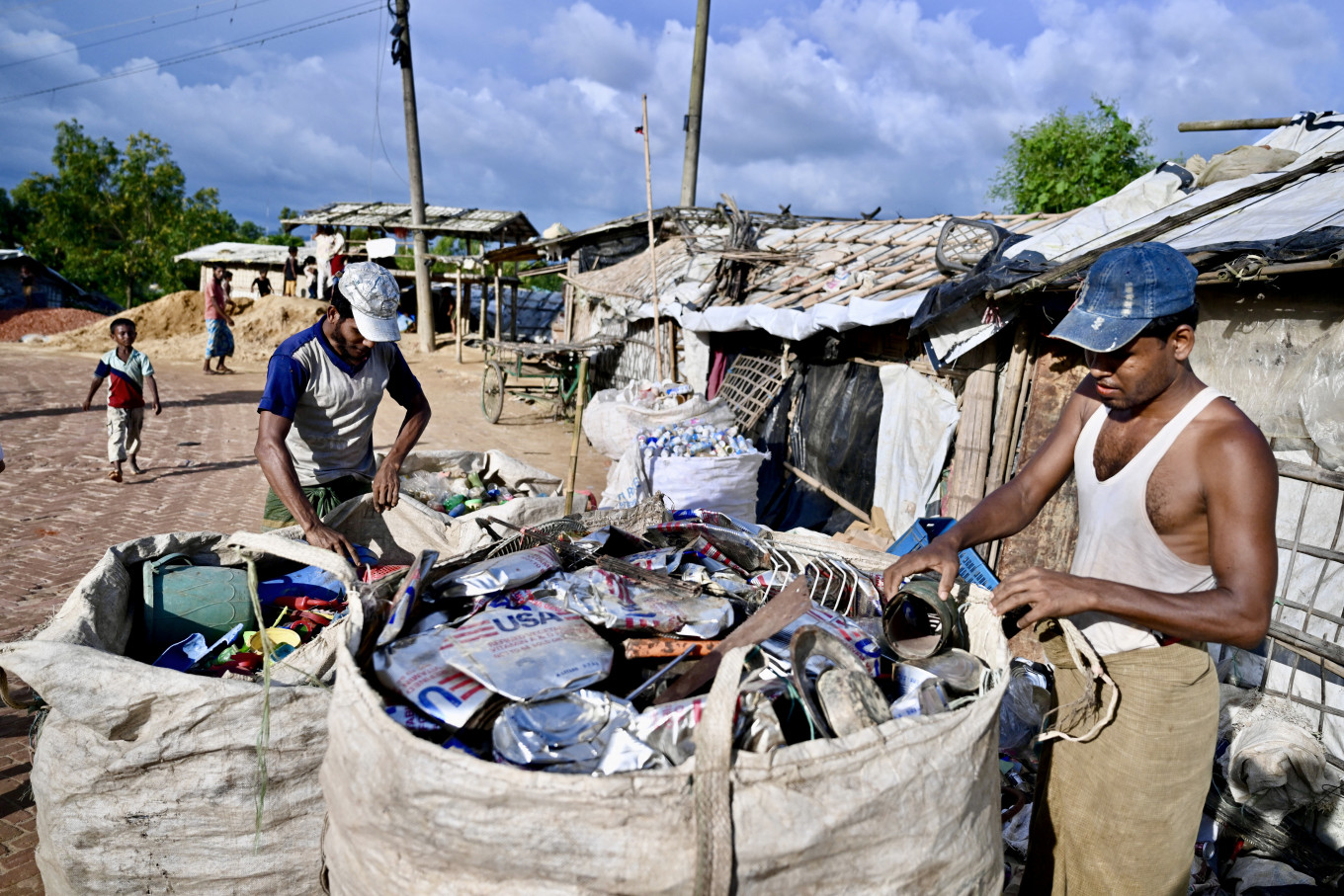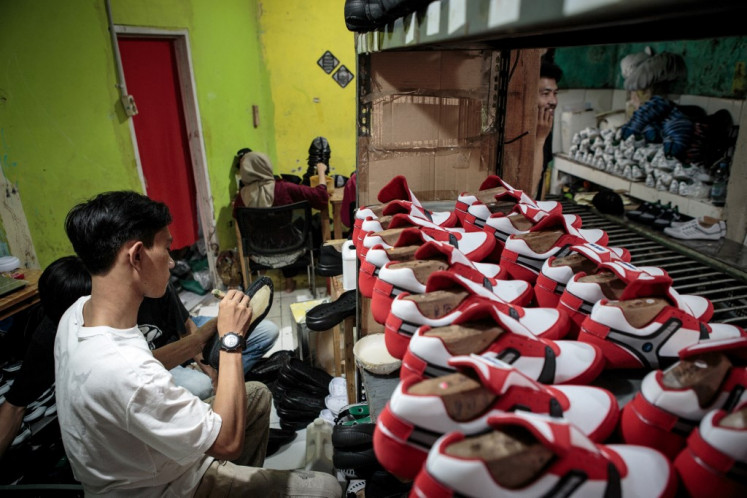Popular Reads
Top Results
Can't find what you're looking for?
View all search resultsPopular Reads
Top Results
Can't find what you're looking for?
View all search resultsWhy Bangladesh must reclaim leverage on the Rohingya
Dhaka must make a decisive shift toward a pragmatic pursuit of its own interests, primarily national security and stability, and aim to leverage its role in the Rohingya issue to bring an end to the crisis, not manage it indefinitely in relative isolation.
Change text size
Gift Premium Articles
to Anyone
P
ast international conferences on the Rohingya issue, along with last week’s High-level Conference on the Situation of Rohingya Muslims and Other Minorities in Myanmar at the United Nations Headquarters in New York, lay bare an uncomfortable truth: Bangladesh is carrying the weight of a genocide it did not commit while the perpetrators in Myanmar remain untouched, their regional allies safeguarding their pipelines and projects.
The West also seems content with symbolic outrage and dwindling aid pledges. Dhaka, thus, has been reduced to the role of host, manager and supplicant, demeaned by the very architecture of “solutions” that never materialize. Bangladesh can no longer afford to be a mere stagehand in this geopolitical theater.
The recent Stakeholders’ Dialogue: Takeaways to the High-Level Conference on Rohingya Situation, organized in Cox’s Bazar by Dhaka, reiterates Bangladesh’s consistent and well-worn priorities: emphasizing the unsustainable strain of hosting over 1.3 million refugees, unequivocally advocating for their safe and dignified repatriation as the only viable solution, and relentlessly calling for greater international burden sharing and political pressure on Myanmar.
These do not represent a new policy direction but are instead a refined repackaging of Bangladesh’s enduring narrative, aimed at maintaining global attention and compelling action from the international community on terms it has championed for years.
Yet such a road map will remain hollow unless it is backed by internal consensus and institutional coherence. The current fragmentation of approaches – foreign ministry diplomacy on one side, security agency containment on the other and civil society’s humanitarian appeals on yet another – has produced dissonance that Myanmar and other regional players easily exploit.
Without a unified position, Bangladesh is unable to wield its potential leverage, whether diplomatic, economic or security-related. What the country requires is a pragmatic road map rooted in its own national interests, one that acknowledges the gap between ideal conditions for “repatriation” and the achievable reality of “return”.
Insisting on the former as a precondition has effectively locked the Rohingya crisis into paralysis. At the same time, the latter, if pursued with robust security guarantees and sustained international oversight, at least offers a path toward easing the pressure on Bangladesh.
Meanwhile, eight years of mass displacement from Rakhine state have not only tested Bangladesh’s capacity but also stretched the social fabric of border communities. They speak of overburdened land and depleted natural resources, farms lying fallow or turned into swamps, forests flattened, essential goods growing costly and crime rising, not just inside the camps but spilling over into surrounding villages.
What started as an emergency has evolved into a long-term burden, marked by repeated influxes of people, prolonged dependency on humanitarian services and camps that no longer feel temporary.
UN registration and biometric exercises in recent years have documented tens of thousands of new arrivals and a steady trickle of people fleeing Rakhine. This trend continues to this day, with more than 150,000 new Rohingya entering the camps in Cox’s Bazar since January 2024, according to its refugee agency UNHCR.
That dynamic makes a purely humanitarian response unsustainable. It is one thing to respond to a short or one-time shock, and another to absorb a rolling crisis with fresh arrivals and little prospect of orderly, safe return.
It is entirely right, and morally admirable, that Bangladesh opened its doors. Yet compassion and charity do not solve strategic problems on their own.
The humanitarian operation has been starved of necessary funds for too long. The Joint Response Plan and other initiatives for the Rohingya are underfunded, and global cuts to humanitarian spending only amplify the risk that essential services in the camps will be reduced, with predictable human consequences and increased risk of instability. As assistance shrinks, the likelihood of local tensions, criminal economies and security incidents spilling beyond the camps increases significantly.
Meanwhile, Myanmar has effectively escaped the costs of its atrocities. Outside of rhetorical condemnations and a patchwork of targeted sanctions by the West, the state and the generals have suffered few consequential penalties that would create pressure for change; many punitive measures have been half-hearted or rolled back.
The Arakan Army, now the dominant force across large swaths of Rakhine, openly dismisses Bangladesh’s concerns while casually leveraging Bangladeshi territory as a rear corridor in its fight against Myanmar’s junta. Its cross-border incursions, from kidnappings of fishermen to disruptions in border areas, highlight both Dhaka’s vulnerability and the absence of credible deterrence.
This stark reality exposes a dangerous imbalance. In effect, Bangladesh is treated not as a regional actor with agency, but as a soft buffer zone: a space to be used and ignored. This erosion of standing underscores how urgently Dhaka needs to recalibrate its posture, not only to safeguard its borders and people but also to compel both state and non-state actors in Myanmar to recognize Bangladesh as a power whose interests cannot be disregarded at will.
This grim reality makes it imperative that Dhaka moves beyond asking for pity and pledges. If Bangladesh is to shift from being the perpetual responder to a party with leverage, it must develop strategic depth; meaning carefully calibrated tools of influence, whether independent of other stakeholders or reliant on them. This would allow Bangladesh to impose political, economic and if necessary, security costs on actors in Myanmar if the crisis remains unaddressed.
That leverage can take many forms: selective diplomatic alignments, calibrated trade and transit measures, legal and accountability initiatives and security and intelligence options targeting the status quo. The goal should be to create credible deterrents so Bangladesh is no longer simply the last refuge but a power that Myanmar and the non-state actors within it must reckon with, forcing them to take adequate measures for the return of Rohingya refugees.
Last week’s UN meeting, much like its predecessors, risks becoming another chapter in the same script: one where Bangladesh performs the role of the beleaguered host, appealing to the conscience of the international community.
If Dhaka is to break this cycle, it must recognize that the discourse must shift, immediately and decisively, from managing a crisis to ending one. This requires abandoning the hope that others will act in Bangladesh’s interests and embracing the difficult work of forging a unified national stance, building credible deterrents and compelling action from Myanmar and its enablers by raising the cost of their inaction.
The choice is no longer between ideal repatriation and imperfect return; it is between continued strategic paralysis and a pragmatic, sovereign pursuit of Bangladesh’s own security and stability.
The era of hard-nosed, self-interested statecraft must begin. Only then can Bangladesh make a case that cannot be ignored.
---
Sk. Tawfique M. Haque is a professor and director of the South Asian Institute of Policy and Governance (SIPG) of North South University. Simon Mohsin is a political and international affairs analyst. The views expressed are personal.











